Becoming a real estate agent involves more than simply earning your license. Although having a license is necessary, starting a successful business includes learning how to generate leads, create business plans, manage clients, and establish a successful marketing strategy. Follow along to learn how to become a real estate agent and valuable tips and resources as you embark on this new career.
1. Consider What It Means to Be a Real Estate Agent
Before you embark on a career as an agent, you need to consider whether it’s the best career path for you. Becoming an independent real estate agent is an exciting career choice that offers unlimited income, flexibility, and autonomy.
On the other hand, real estate agents don’t have a guaranteed income or insurance, and it can take new agents many months to make their first sale. Before diving into the steps to become a real estate agent, consider the pros, cons, and the top reasons why real estate agents fail to ensure that you are well-prepared for this career.
Take our quiz to see if being a real estate agent is the best choice for you:
Is being a real estate agent the right career for you?
Pro tip: Being an agent isn’t the only career option if you’re interested in the real estate industry. For example, consider learning how to become a real estate manager, home inspector, or real estate appraiser. For even more options, read 22 Real Estate Career Paths (With or Without a License)
Costs of Becoming a Real Estate Agent
The first step in becoming a real estate agent is being prepared for an unconventional income. Think about how much money you need to earn and how much you will invest back into your business. A real estate agent’s salary is not consistent or guaranteed, especially when you first enter the industry. Since your salary is based 100% on commission at the majority of brokerage firms, you may have months where you earn more money than others.
Plus, there are many upfront costs when learning how to become a real estate agent. These include:
- Prelicensing courses: Ranging from $119 to $1,599
- Exam fees: Ranging from $70 to $530
- Office expenses: Ranging from $50 to $2,500
- Insurance: May cost between $500 and $1,000 per year
- Coaching or training: May cost between $500 and $2,000
- Professional memberships or associations: The National Association of Realtors (NAR) has an annual fee of $150
- Multiple Listing Service (MLS): Can range between $20 and $50 per month
- Marketing materials: Recommended to pay about 10% of your gross commissions
In addition, most agents find that real estate tools and software are incredibly useful for their business, even with added costs. You will also have additional expenses like travel, auto maintenance, internet, and an unlimited mobile plan.
Download our realtor cost tracker to keep track of your business expenses:
For an even more detailed breakdown of the costs of becoming a real estate agent, read our guide: How Much Does It Cost to Become a Realtor in 2023?
2. Earn a Real Estate License
Once you are confident that real estate sales is a good career choice for you, you must learn what the requirements are to be a real estate agent. In order to legally provide real estate services to buyers and sellers, you must earn a real estate license. Every state differs in its requirements to be a real estate agent, including the number of prelicensing hours, legal qualifications, exam structure, and application process.
Here are the basic steps of how to get a license for a property agent:
The legal qualifications to be a real estate agent differ from state to state but typically include an age requirement and an education requirement. For example, in Kansas, you must be 18 years old and have a high school diploma or GED, while Missouri only requires potential agents to be 18 years old and has no education mandates. In addition, all aspiring agents must disclose any criminal offenses and have their background reviewed by their state’s Real Estate Commission.
One of the biggest steps to becoming a real estate agent is completing your prelicensing education. The hours you’re required to complete vary by state and can range from 40 hours to 168 hours. You must choose an accredited real estate school, but it can be an online or in-person school. Your decision on which school to attend depends on your preferences in learning format and whether you learn best in a traditional classroom environment or prefer a technology-based approach.
If you’re looking for online options, take a look through our article 5 Best Accredited Real Estate Schools for Online Learners to review some of the best schools in the country, like Colibri Real Estate, The CE Shop, and Kaplan.
After you’ve completed your prelicensing coursework, you’re ready to tackle your real estate exam. The exam will test you on both national and state-specific knowledge you’ve gained during your education. Each state exam differs in the number of questions, passing exam score, and amount of time to complete the exam. However, the exam structure is in multiple-choice format and is administered on the computer for most states.
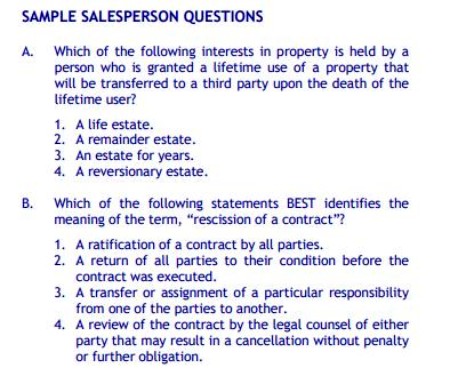
Sample New Jersey exam questions
(Source: PSI Candidate Handbook)
If you want to test your skills and knowledge, take our free practice exam and review sample questions. Plus, download our Exam Prep e-book. We include a pre-assessment to test your knowledge as well as helpful information about what’s included in the exam, the length and structure of the exam, study tips, and sample questions from PrepAgent.
In order to have an active real estate license, you must be sponsored by a brokerage. Your license will “hang” under the brokerage firm’s license and allow you to practice real estate legally. Choosing the right brokerage is one of the most important tips for new real estate agents, so make sure you research multiple options. There are many aspects to consider when you’re deciding on a brokerage, like:
- Size
- Location
- Specialization (e.g., residential or commercial)
- Training program/mentorship
- Commission structure
- Reputation
- Lead generation
- Marketing
To help you confidently choose the right brokerage, read our detailed guide and get a free evaluation rubric: How to Choose a Real Estate Company to Work For.
The final step to getting your real estate license is submitting your license application. Most states have moved their application system online, although a few still allow you to submit your paper application through the mail.
Applicants must submit their application along with their education completion certificate, passing exam score, fee, and additional documentation, depending on the state. This will allow you to register as a real estate agent in your state and perform real estate agent duties.
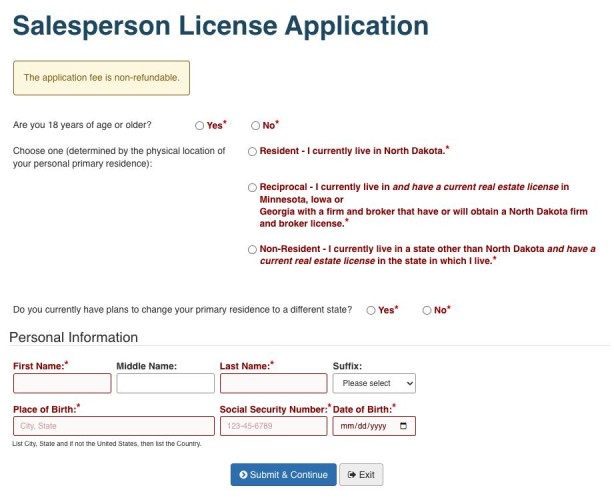
North Dakota real estate license application (Source: NDREC)
For specific directions on how to get a real estate license in your state, visit our article How to Get a Real Estate License in Every State, pick your state on the map, and read the step-by-step directions to begin your real estate journey.
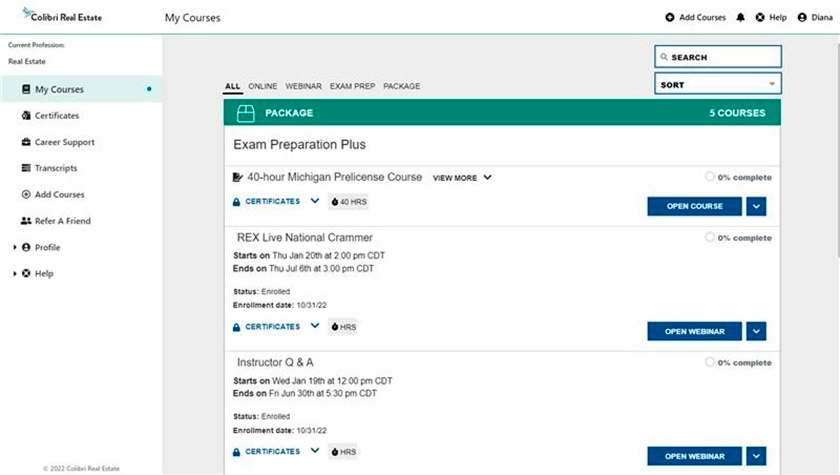
Colibri Real Estate interface
Consider working with a real estate education platform like Colibri Real Estate to help you work through the process. Colibri provides a variety of prelicensing course packages in every state, with additional tools and resources to help you pass the exam, get instructor support, and access a full library of professional development materials. Plus, the school offers education for every step of your career, including continuing education, broker licensing, post-licensing, and even a luxury real estate certification.
Visit Colibri Real Estate – Use Promo Code: FSB30 for 30% off
3. Organize & Set Up Real Estate Business Tools
While you can officially add “real estate agent” to your resume after earning your license, learning how to be a real estate agent involves many more steps. The daily activities of an agent include communicating with clients, conducting transactions, generating leads, organizing your schedule, planning for your business, and creating marketing materials. While your real estate broker should provide some tools and systems, there are many additional resources to help you become successful.
Real Estate Business & Marketing Plan
Reading about what to do to become a real estate agent is easy, but the steps can become confusing once you have your license in hand. By creating a business plan, you’ll set clear goals and evaluate multiple areas of your business, which will help you define the next steps and generate an income more quickly. Your business plan should include:
- Mission statement
- SWOT analysis to analyze the strengths, weaknesses, opportunities, and threats
- Specific and measurable goals
- Marketing strategies
- Lead generation strategies
- Income goal
- Time to revisit your plan
To help you get started, learn how to write a real estate business plan and use our free template.
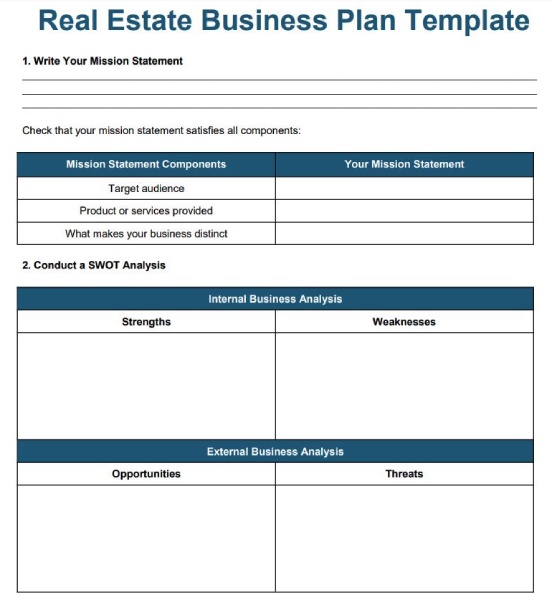
Real estate business plan template
Along with your business plan, make sure you also create a real estate marketing plan. This will more clearly define your marketing goals, budget, and competition, and help you create a plan to achieve each goal. Start with our guide and free template: Free Real Estate Marketing Plan Template & Strategy Guide
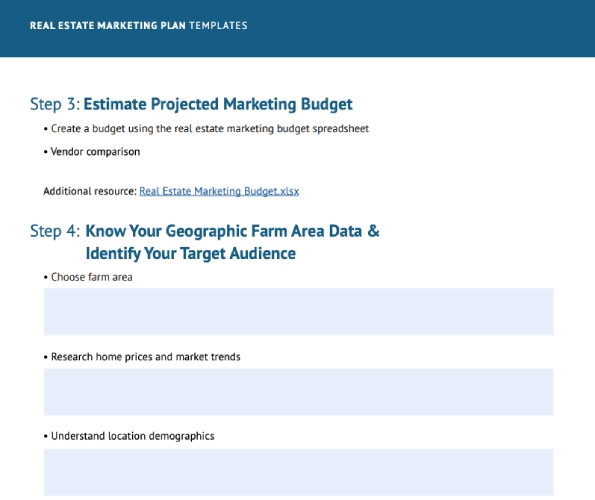
Real estate marketing plan template
Lead Generation Strategy
Learning how to generate leads is one of the quintessential steps to becoming a real estate agent and building a profitable business. You can purchase leads, or they can be generated organically through friends and family (also known as your sphere of influence), social media, or word of mouth. As you learn to be a real estate agent, knowing how to get real estate referrals consistently will help you build a strong client base.
There are an unlimited number of strategies to generate leads, so start with our guide: Top 17 Free & Paid Real Estate Lead Generation Strategies. Learn more about free strategies and lead generation companies that supplement your lead generation efforts, like Placester and Zillow Premier Agent.

Sample real estate website (Source: Market Leader)
One excellent option for agents who want to generate buyer and seller leads is Market Leader. Simply choose your target farm area by ZIP code and start getting exclusive leads that you don’t have to compete for. It also helps you engage your leads effectively through a website, automated email campaigns, and pay-per-click advertising on Google and Facebook. Plus, the Market Leader customer relationship manager (CRM) also assists with organizing and prioritizing which leads are most likely to convert.
Client Relationship Management (CRM) System
Another important tool to have when you’re learning how to become a real estate agent is a CRM system. When you’re first starting out as a real estate agent, you may feel like a spreadsheet will suffice to organize your contacts and follow-ups. But as you continue to generate leads consistently and nurture past clients, a spreadsheet will not be sufficient to prevent valuable relationships from falling through the cracks.
Luckily, there are tools available, known as CRM software, to efficiently manage all of your clients in one place. The main function of CRMs is to organize your client contacts and help you maintain consistent communication with them via email, text, and phone calls. Similar to lead generation tools, there are options for free CRMs, like HubSpot and Freshsales, and paid versions, all of which have different features that can benefit client management.
LionDesk CRM dashboard (Source: LionDesk)
If you’re not sure where to start, one of the best real estate CRMs is LionDesk. It is an all-in-one CRM with lead generation tools and a transaction management system. It organizes your contacts, builds multi-channel automated campaigns, and sends task reminders. LionDesk also provides Facebook ad management, a power dialer to reach clients faster, and over 100 third-party integrations. A tool like LionDesk is beneficial for any agent who wants to efficiently manage their time with minimal effort. Try it free for 30 days.
Marketing Materials
After you’ve developed your real estate business and marketing plans, you need to set yourself up for success with good quality marketing materials. Ideally, you’ll start establishing a strong real estate brand with items like a logo, headshot, and brand colors. All materials, whether print or digital, will include your branding elements and help build trust and recognition among your target audience.
Here are a few of the most essential real estate marketing materials for agents:

Real estate social media management freelancers (Source: Fiverr)
If you are not particularly savvy in design, branding, or social media, outsource these tasks to an expert or specialist through Fiverr. It is a freelance marketplace where you can find specialists to help you establish a strong brand, design and create marketing materials, and even create ongoing social media content. Plus, you can review each freelancer’s previous work and reviews and find someone for almost any budget.
4. Get Educated on the Real Estate Market
Through all of the steps to become a real estate agent, you should continually be researching and staying up to date on the housing market. Some prelicensing coursework may include information on this, but it’s your responsibility to develop an in-depth understanding of how the market works, current issues, and predictions for the future. Being able to discuss this with current and potential clients will show your expertise and provide insightful information to guide them in their transactions.

Homebuyer demand index (Source: Redfin)
To learn about the housing market, regularly read real estate publications and blogs like RealTrends, Keeping Current Matters, and Inman. You may even compare current statistics to trends from the past. This will provide you with a better understanding of how real estate trends change over time and give you the ability to predict the housing market in the future.
To start learning about the market and other important data, read our guides:
- 20 Most Crucial Real Estate Statistics in 2023
- 20 Key Real Estate Rental Statistics in 2023
- 24 Vital Commercial Real Estate Statistics for 2023
- Top 10 Strongest & Weakest Housing Markets by State 2023
5. Build a Successful Real Estate Career & Continue Learning
Once you have learned how to become a real estate agent, created business and marketing plans, and compiled all the necessary systems, you are on your way to becoming successful in real estate. The key is to be consistent and continually improve on these tools by adding new methods of lead generation and marketing, networking with other real estate professionals, and seeking out additional training and resources.
If you’re ready for more ideas now, read these articles that are filled with tips and tricks to help you succeed in the real estate industry:
Bottom Line
Getting your real estate license is only one of the steps to becoming a real estate agent. While you must have a valid license to complete transactions, there are many other essential components of becoming a true real estate professional, like lead generation, marketing, business plans, and market knowledge. By following these tips, you will be more likely to become a successful real estate agent.